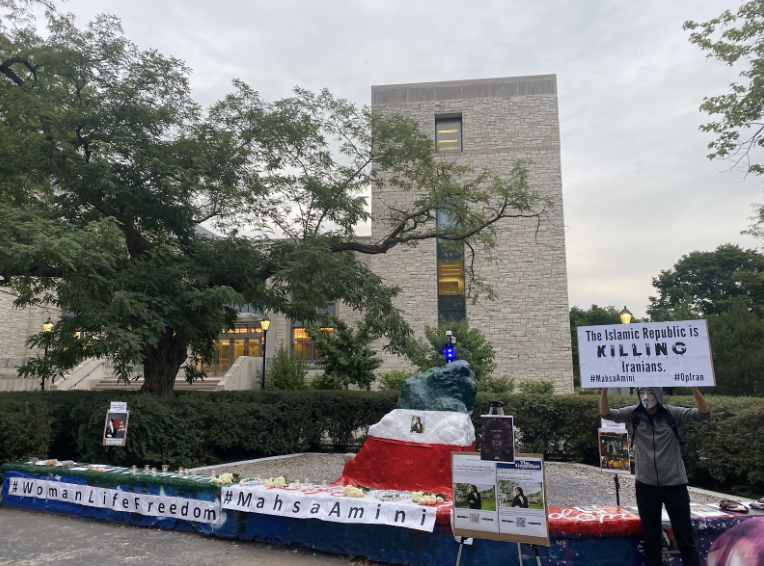
From 7,000 miles away, the Iranian diaspora and other supporters are joining the fight for Iranian women’s rights on Northwestern’s campus.
On Sept. 23, the Iranian Student Association – a student group at Northwestern – hosted a vigil at the Rock to express their solidarity with Iranian activists, while educating the Northwestern community about ongoing protests in the country.
“As an Iranian living in America, I felt it was really important to come out and show my solidarity and support for my community,” a Weinberg second-year said, choosing to remain anonymous due to safety concerns.
Mahsa Amini, a 22-year-old Iranian woman living in Tehran, Iran, died on Sept. 16 after being detained by the "morality police," in an event that has sparked outrage and protests against the Iranian government. According to her family, the police detained Amini for allegedly wearing her hijab incorrectly, and officers beat her in a van following her arrest, based on eyewitness reports. While the Iranian government claims Amini died of a pre-existing condition, her family is calling this a cover-up, sparking protests in Iran and around the world.
In memory of Mahsa Amini, the Iranian Student Association (IRSA) at Northwestern University is holding a candlelight vigil tonight (Friday, Sept. 23) at 6:00 p.m. at The Rock. All members of the community are welcome to join. pic.twitter.com/mbH0WxN7U9
— tgsatnu (@TGSatNU) September 23, 2022
More than 60 people at Northwestern gathered at a vigil for Amini on Friday. The group lit candles and laid flowers in front of the Rock, with a picture of Amini in the center surrounded by the colors of the Iranian flag.
The organizers shared that their primary goal was for the Northwestern community to be aware of the human rights abuses in Iran. According to the group, protests led by women cutting their hair and burning their hijabs in the streets of Iran amidst governmental suppression inspired organizers to act, bringing the movement to Northwestern's campus.
Throughout the vigil, the organizers spoke out in both Farsi and English, chanting, “Say her name: Mahsa Amini,” “Women, life, freedom” and “Justice for Mahsa.” Other chants called for solidarity against the government, saying “Down be the dictator,” and, “If we don’t become one, they kill us one by one.”
“Many big issues happening outside of Northwestern aren’t recognized especially at a predominantly white institution,” the Weinberg second-year added. “The struggles of people of color are overlooked and it is important to recognize these struggles, just by showing up.”
Photos from the Iranian Students Association candlelight vigil in memory of Mahsa Amini. IRSA is dedicated to promoting social, intellectual, and cultural activities for Iranian students and scholars at Northwestern and interested members of the University community. #mahsaamini pic.twitter.com/74yMLEMiAE
— tgsatnu (@TGSatNU) September 25, 2022
Shortly after the death of Amini, the Iranian Government cut off internet services in most of the country, in an attempt to suppress all dissent and criticism. Organizers of the Northwestern demonstration expressed concern for their family members’ safety, being currently unable to contact those living in Iran because of these moves. Meanwhile, several have been killed and hundreds have been injured due to gunfire unleashed on peaceful protesters during demonstrations.
“It could happen to my mom, my sister, other girls who live in Iran”, an Iranian graduate student said, also choosing to remain anonymous. “We want [the Northwestern Community] to know there is an Iranian community here. We support freedom and human rights… We have religious people who choose to wear the hijab, we have non-religious people. Everyone should be able to choose how to dress.”